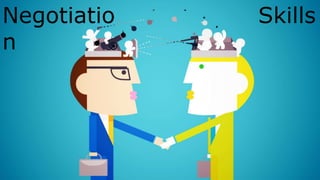
Negotiation Skills
- 3. Negotiation Defined Negotiation is a method by which people settle differences. It is a process by which compromise or agreement is reached while avoiding argument and dispute.
- 5. Preparation Before any negotiation takes place, a decision needs to be taken as to when and where a meeting will take place to discuss the problem and who will attend. Setting a limited time-scale can also be helpful to prevent the disagreement continuing.
- 6. Stages of Negotiation 1.Preparation 1.Discussion 1.Clarification of goals 1.Negotiate towards a Win- Win outcome 1.Agreement 1.Implementatio n of a course of action
- 7. Discussion During this stage, individuals or members of each side put forward the case as they see it, i.e. their understanding of the situation.
- 8. Clarifying Goals From the discussion, the goals, interests and viewpoints of both sides of the disagreement need to be clarified.
- 9. Negotiate Towards a Win-Win Outcome This stage focuses on what is termed a 'win-win' outcome where both sides feel they have gained something positive through the process of negotiation and both sides feel their point of view has been taken into consideration.
- 10. Agreement Agreement can be achieved once understanding of both sides’ viewpoints and interests have been considered.
- 11. Implementing a Course of Action From the agreement, a course of action has to be implemented to carry through the decision.
- 12. Failure to Agree If the process of negotiation breaks down and agreement cannot be reached, then re-scheduling a further meeting is called for. This avoids all parties becoming embroiled in heated discussion or argument, which not only wastes time but can also damage future relationships.
- 13. Informal Negotiation There are times when there is a need to negotiate more informally. At such times, when a difference of opinion arises, it might not be possible or appropriate to go through the stages set out above in a formal manner. Nevertheless, remembering the key points in the stages of formal negotiation may be very helpful in a variety of informal situations.
- 14. In any negotiation, the following three elements are important and likely to affect the ultimate outcome of the negotiation: 1.Attitudes 1.Knowledge 1.Interpersonal Skills
- 15. Negotiation Models In this model no body is at less and it is the accepted model. Eg- Customer and shopkeeper In this model one wins and other loose Two parties not willing to accept each others views
- 16. RADPAC Model of Negotiation CloseAgreementProposeDebateAnalysisRapport
- 17. Top Ten Effective Negotiation Skills
- 24. https://www.youtube.com/watch?v=7rzq2Bq_EsA Lose lose model https://www.youtube.com/watch?v=lE5ko4ZeC_Y How to win any Negotiation http://www.nytimes.com/2015/12/13/world/asia/korean-negotiators- falter-in-efforts-to-ease-strain-between-2-nations.html?_r=1 Live example
- 25. “Let us never negotiate out of fear. But let us never fear to negotiate.” – John F. Kennedy
Notas del editor
- It is inevitable that, from time-to-time, conflict and disagreement will arise as the differing needs, wants, aims and beliefs of people are brought together. Without negotiation, such conflicts may lead to argument and resentment resulting in one or all of the parties feeling dissatisfied. The point of negotiation is to try to reach agreements without causing future barriers to communications.
- http://www.skillsyouneed.com/ips/negotiation.html
- At the subsequent meeting, the stages of negotiation should be repeated. Any new ideas or interests should be taken into account and the situation looked at afresh. At this stage it may also be helpful to look at other alternative solutions and/or bring in another person to mediate. Find more at: http://www.skillsyouneed.com/ips/negotiation.html#ixzz4RzjNFcpx
- http://www.skillsyouneed.com/ips/negotiation.html
